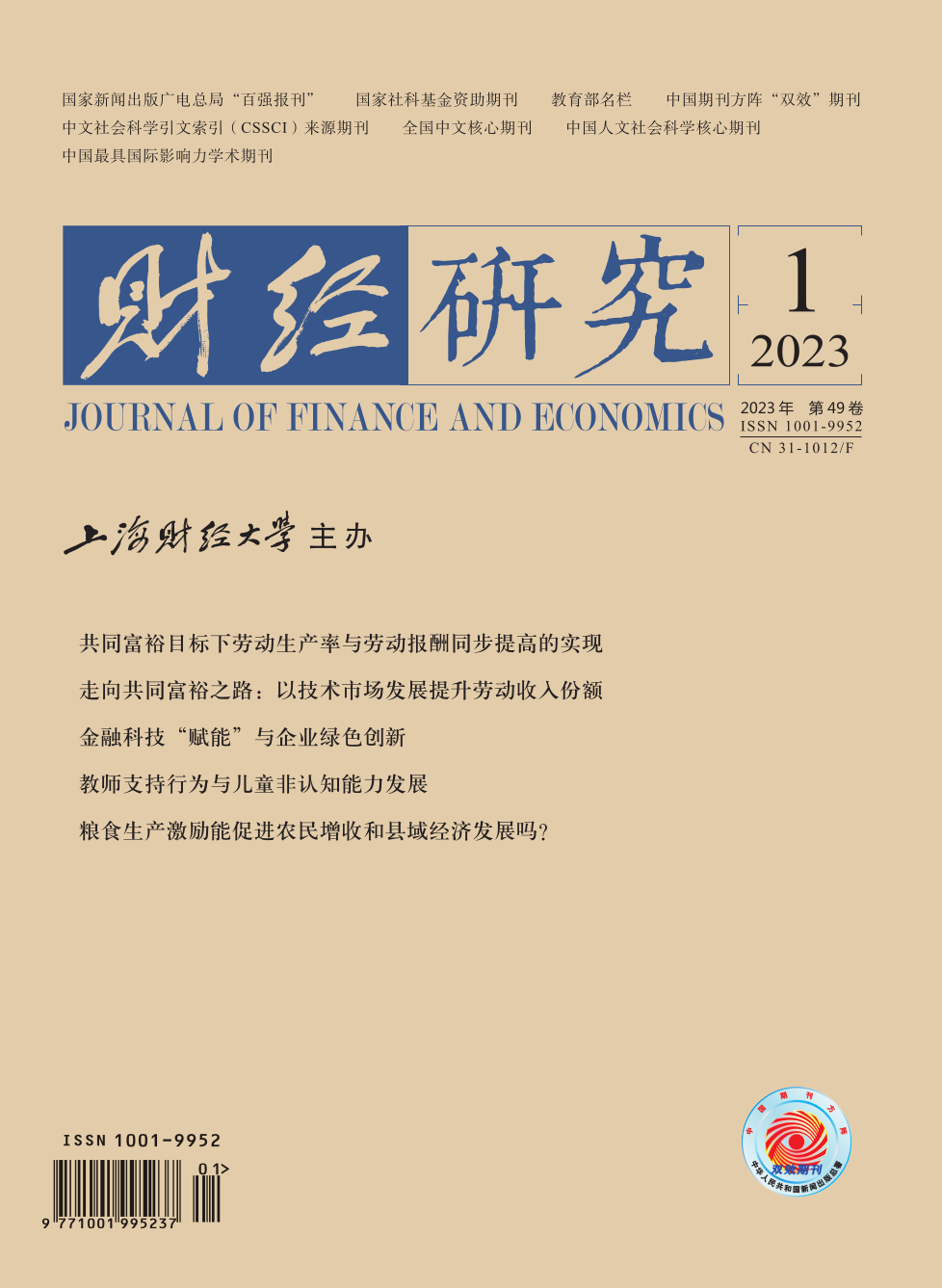人力资本能力包括认知能力与非认知能力,教育的内卷化发展使得家庭、学校和老师都格外注重认知能力培养,往往忽视了非认知能力。然而,非认知能力会对个体未来发展产生深远影响。在人力资本积累过程中,学校尤其是老师对儿童身心健康成长起到了不可替代的作用。文章采用中国教育追踪调查(
教师支持行为与儿童非认知能力发展
摘要
参考文献
摘要
2 王春超, 张承莎. 非认知能力与工资性收入[J]. 世界经济,2019,(3):143−167. DOI:10.19985/j.cnki.cassjwe.2019.03.008
3 Akee R, Copeland W, Costello E J, et al. How does household income affect child personality traits and behaviors?[J]. American Economic Review,2018,108(3): 775−827. DOI:10.1257/aer.20160133
4 Bellows J, Miguel E. War and local collective action in sierra leone[J]. Journal of Public Economics,2009,93(11-12): 1144−1157. DOI:10.1016/j.jpubeco.2009.07.012
5 Bergman P. Parent-child information frictions and human capital investment: Evidence from a field experiment[J]. Journal of Political Economy,2021,129(1): 286−322. DOI:10.1086/711410
7 Chen Y Y, Feng S Z. The education of migrant children in China’s urban public elementary schools: Evidence from Shanghai[J]. China Economic Review,2019,54: 390−402. DOI:10.1016/j.chieco.2019.02.002
8 Cunha F, Heckman J J. Formulating, identifying and estimating the technology of cognitive and noncognitive skill formation[J]. Journal of Human Resources,2008,43(4): 738−782. DOI:10.1353/jhr.2008.0019
9 del Bono E, Francesconi M, Kelly Y, et al. Early maternal time investment and early child outcomes[J]. The Economic Journal,2016,126(596): F96−F135. DOI:10.1111/ecoj.12342
10 Deryugina T, Molitor D. Does when you die depend on where you live? Evidence from Hurricane Katrina[J]. American Economic Review,2020,110(11): 3602−3633. DOI:10.1257/aer.20181026
11 Gong J, Lu Y, Song H. The effect of teacher gender on students’ academic and noncognitive outcomes[J]. Journal of Labor Economics,2018,36(3): 743−778. DOI:10.1086/696203
12 Gregory A, Hafen C A, Ruzek E, et al. Closing the racial discipline gap in classrooms by changing teacher practice[J]. School Psychology Review,2016,45(2): 171−191. DOI:10.17105/SPR45-2.171-191
13 Heckman J J, Humphries J E, Veramendi G. Returns to education: The causal effects of education on earnings, health, and smoking[J]. Journal of Political Economy,2018,126(S1): S197−S246. DOI:10.1086/698760
14 Heckman J J, Moon S H, Pinto R, et al. The rate of return to the HighScope perry preschool program[J]. Journal of Public Economics,2010,94(1-2): 114−128. DOI:10.1016/j.jpubeco.2009.11.001
15 Heckman J J, Stixrud J, Urzua S. The effects of cognitive and noncognitive abilities on labor market outcomes and social behavior[J]. Journal of Labor Economics,2006,24(3): 411−482. DOI:10.1086/504455
16 Heineck G, Anger S. The returns to cognitive abilities and personality traits in Germany[J]. Labour Economics,2010,17(3): 535−546. DOI:10.1016/j.labeco.2009.06.001
17 Hombrados-Mendieta M I, Gomez-Jacinto L, Dominguez-Fuentes J M, et al. Types of social support provided by parents, teachers, and classmates during adolescence[J]. Journal of Community Psychology,2012,40(6): 645−664. DOI:10.1002/jcop.20523
18 Hood W, Bradley G L, Ferguson S. Mediated effects of perceived discrimination on adolescent academic achievement: A test of four models[J]. Journal of Adolescence,2017,54(1): 82−93. DOI:10.1016/j.adolescence.2016.11.011
19 Huang W, Li T, Pan Y H, et al. Teacher characteristics and student performance: Evidence from random teacher-student assignments in China[R]. IZA Discussion Paper No. 14184, 2021.
20 Jackson M O. The friendship paradox and systematic biases in perceptions and social norms[J]. Journal of Political Economy,2019,127(2): 777−818. DOI:10.1086/701031
21 Jia X J, Liu X. Perceived discrimination and antisocial behaviour among Chinese rural-to-urban migrant adolescents: Mediating effects of social support[J]. International Journal of Psychology,2017,52(4): 327−335. DOI:10.1002/ijop.12280
22 Kautz T, Heckman J J, Diris R, et al. Fostering and measuring skills: Improving cognitive and non-cognitive skills to promote lifetime success[R]. NBER Working Paper No. 20749, 2014.
23 Kinsler J, Pavan R. Local distortions in parental beliefs over child skill[J]. Journal of Political Economy,2021,129(1): 81−100. DOI:10.1086/711347
24 Ogden T, Hagen K A. Adolescent mental health: Prevention and intervention[M]. New York: Routledge, 2013.
26 Pfeifer J H, Blakemore S J. Adolescent social cognitive and affective neuroscience: Past, present, and future[J]. Social Cognitive and Affective Neuroscience,2012,7(1): 1−10. DOI:10.1093/scan/nsr099
27 Shin H, Ryan A M. Friend influence on early adolescent disruptive behavior in the classroom: Teacher emotional support matters[J]. Developmental Psychology,2017,53(1): 114−125. DOI:10.1037/dev0000250
28 Suldo S M, Friedrich A A, White T, et al. Teacher support and adolescents’ subjective well-being: A mixed-methods investigation[J]. School Psychology Review,2009,38(1): 67−85. DOI:10.1080/02796015.2009.12087850
29 Wayne A J, Youngs P. Teacher characteristics and student achievement gains: A review[J]. Review of Educational Research,2003,73(1): 89−122. DOI:10.3102/00346543073001089
30 Wu J, Zhang J S. The effect of parental absence on child development in rural China[J]. Asian Economic Policy Review,2017,12(1): 117−134. DOI:10.1111/aepr.12166
31 Zárate R A. Social and cognitive peer effects: Experimental evidence from selective high schools in Peru[R]. Job Market Paper, 2019.
引用本文
吴莞生, 吴贾, 周芷涵. 教师支持行为与儿童非认知能力发展[J]. 财经研究, 2023, 49(1): 94-108.
导出参考文献,格式为:
上一篇:房价与城镇居民健康





 6561
6561  9505
9505

